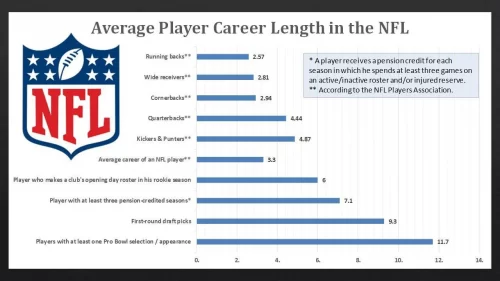
The National Football League (NFL) is the most popular and successful sports league in the United States. With its legions of passionate fans and billions of dollars in annual revenue, it is no wonder that there is such intense interest in the men who take the field every Sunday. However, despite the glamour and prestige associated with the NFL lifestyle, many players have short-lived careers, often lasting only a few years.
In this blog post, we will explore why NFL player careers are so short and discuss potential solutions. We will examine the physical and psychological toll of the sport, the influence of money and fame, and the impact of team management decisions. By looking at these factors, we can gain a greater understanding of why so many NFL careers do not last long and how we can help to extend the careers of players.
1. Physical Tolls of the Game
The physical toll of playing in the NFL is one of the main reasons why NFL player careers are so short. Every game, players are subjected to hundreds of collisions, tackles, and other high-impact maneuvers. This can lead to serious and long-term injuries, such as concussions, torn ligaments and muscles, and back and neck injuries.
The physical nature of the game, combined with the frequency of the collisions, means that players are more likely to suffer from these injuries and need to take an extended time to heal. This can limit the longevity of their careers, as injuries can prevent them from playing and ultimately shorten the length of their careers.
2. Risk of Injury
One of the main reasons why NFL player careers are so short is the risk of injury. The physicality of the league is something that draws many people to the sport. However, it also puts players at risk for serious injuries. Football is a collision sport, and the contact that players endure can cause chronic or acute injuries or even long-term neurological damage.
Not only do these injuries affect player performance, but they can also lead to career-ending consequences. Teams must be prepared to replace injured players on short notice and move on quickly, which is why NFL player careers tend to be relatively short.

3. Financial Mismanagement
Financial mismanagement is another reason why NFL careers can be so short. Many athletes come from lower socioeconomic backgrounds, often without access to financial education. As a result, they are unprepared when it comes to managing their newfound wealth. In addition, athletes are often targeted by scam artists who offer them “guaranteed” investments that never pan out. Unfortunately, the cycle of poor money management can lead to a quick burnout of their earnings, regardless of how long they have been in the league.
4. Poor Investment Opportunities
Poor investment opportunities are another major factor in why NFL player careers are so short. Despite the high salaries, many NFL players fail to invest their money wisely. They often rely on financial advisors who do not have their best interests in mind or worse, they invest in fly-by-night schemes or start-up businesses that fail. As a result, when their NFL careers come to an end, they are often left with few resources to fall back on and have trouble finding their financial footing again.
5. Transitioning to Post-Career Life
The transition to post-career life can be difficult for many professional football players. After playing for years, some players struggle to adjust to life without the game. They miss the camaraderie of their teammates and the excitement of playing on Sundays. The physical, mental, and emotional demands of the NFL require players to be in peak physical condition, and many players find it hard to adjust to life without rigorous training and practice.
Additionally, many former players are unsure of how to financially plan for their future. They need to find a way to make up for the lost income and find a new career path. Fortunately, there are a number of resources available to help players make this transition. The NFL offers career counselling and mentorship programs to help players transition to post-career life.
Conclusion
In conclusion, the NFL is a physically demanding and fast-paced sport that takes its toll on players’ bodies. The average career length of NFL players is only 3.3 years, and the average salary is only $2.7 million. The short career length and the physical demands of the sport can make it difficult for players to find ways to earn money after their career has ended. It is important for NFL players to understand the risks of their chosen profession and plan for life after football.






